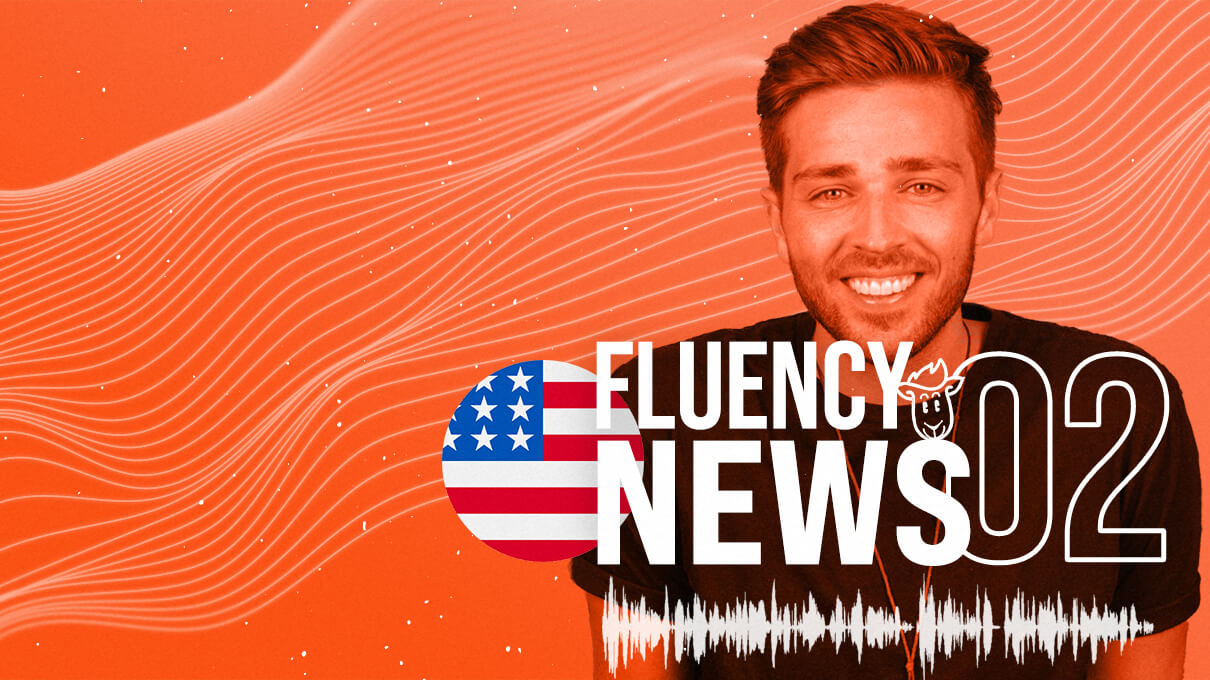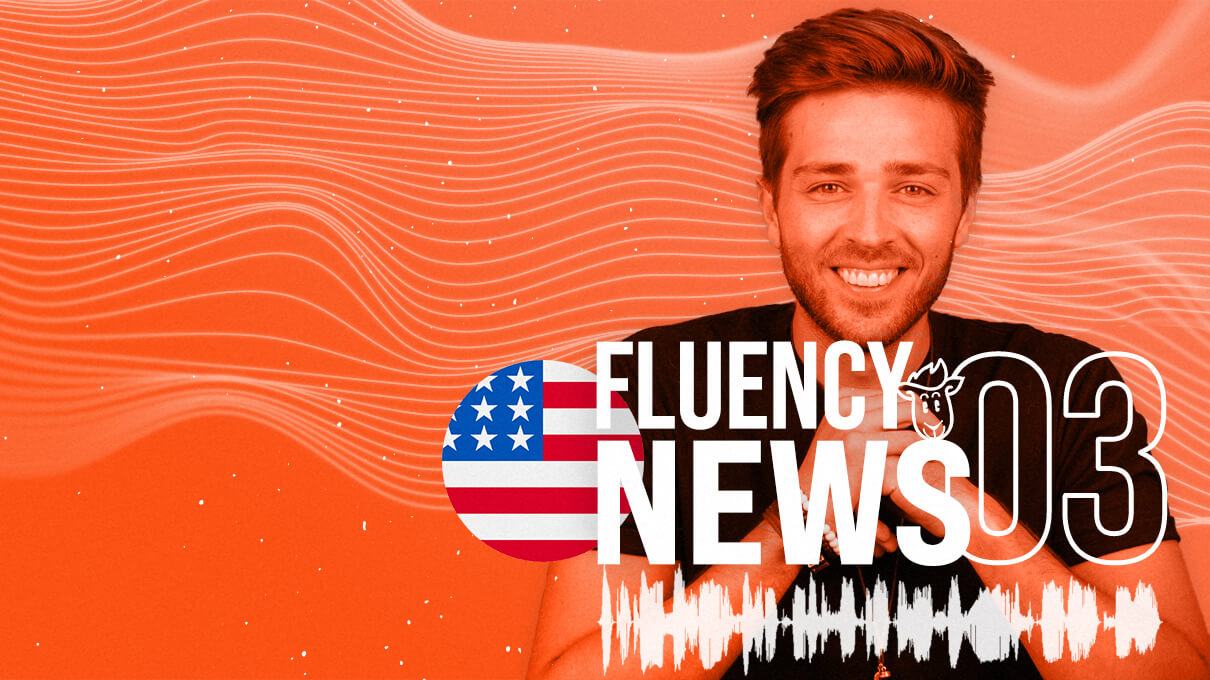Fluency News #40

As notícias da semana em inglês para você treinar o seu listening!
Navegue pelo conteúdo
Hello, everyone!
Sejam bem-vindos e bem-vindas a mais um episódio da nossa nova série de podcasts, o Fluency News! Aqui, você vai poder treinar a sua escuta e ficar por dentro do que está acontecendo no mundo, sempre com as três principais notícias da semana, tudo em inglês! Ao longo do episódio, nós também adicionamos explicações em português das coisas que achamos que precisam de mais atenção, assim você não perde nenhum detalhe!
No episódio desta semana, falamos sobre a nova aliança no governo de Israel, o encontro do G-7 e sobre o desmatamento da floresta Amazônica, principalmente no Brasil. Também falamos sobre os esforços de Gana para acabar com o desmatamento no país.
Temos uma página de dicas de inglês no Instagram, vá conferir! @fluencytvingles
Toda semana, temos um novo episódio do Fluency News, não deixe de escutar! See you!
Este episódio foi escrito por Lívia Pond.
Transcrição
What is up, everyone! Welcome back to Fluency News, the podcast made for you to put your English skills to the test, while getting informed. I’m Scott Lowe, one of your native English-speaking teachers here at Fluency Academy.
If this is your first time listening to this podcast series, don’t worry about his being episode 40. The way we set up these episodes, you can start listening at any time, including today!
You probably already know this, but the more contact you have with the language you’re learning, the easier and faster it will be for you to assimilate things. That’s why you should check back every week and visit fluency.io for a ton of free content for you to study any time you want.
As always, we’re going to see what’s happening around the world, and I’ll share with you some of the most relevant stories of the week. I’ll also take the time to explain in Portuguese any structures that might need some more attention.
Ok, now let’s jump into it. We’re starting this episode with an update to a story we’ve covered a couple of times. Israel’s Parliament approved a new coalition, ending Netanyahu’s record 12-year rule.
Benjamin Netanyahu’s grip on power ended on Sunday, his administration replaced by a coalition government assembled by the centrist Yair Lapid and ultra-nationalist Naftali Bennett. In a 60-59 confidence vote, Israel’s parliament approved the new government and Bennet was sworn in as prime minister.
A formal ceremony was not held due to Benjamin Netanyahu feeling “cheated” by the new government, the Associated Press reported.
Several world leaders have welcomed Israel’s new government. US President Joe Biden said the United States remained committed to Israel’s security and would work with its new government.
“I look forward to working with Prime Minister Bennett to strengthen all aspects of the close and enduring relationship between our two nations,” Biden said. “Israel has no better friend than the United States.
German Chancellor Angela Merkel said she was looking forward to “working closely” with Israel’s new prime minister.
“Germany and Israel are connected by a unique friendship that we want to strengthen further. With this in mind, I look forward to working closely with you,” Merkel said in a message addressed to Bennett and shared by her spokeswoman Ulrike Demmer on Twitter.
Canadian Prime Minister Justin Trudeau said he looked forward to working with Bennett and Lapid “to keep our people safe and supported as we recover from the global COVID-19 pandemic, and help both of our countries build back better”.
Not all statements were in favor of the new government, however. Removed Israeli prime minister took to social media promising to return soon to power.
“Do not let your spirit fall,” he said on Twitter. “We’ll be back – and faster than you think,” he added.
Nessa notícia, vimos muitos usos de “look forward to”, no presente, futuro e passado. LOOK FORWARD é um phrasal verb muito comum. Ele é usado para se referir a algo que é muito esperado, antecipado. Pode ser traduzido para “esperar ansiosamente”, ou “estar ansioso por”. Quando usado com um verbo, esse verbo está sempre na forma contínua, acrescido de ING. Aqui, o phrasal verb está seguido do verbo WORK, então fica LOOKING FORWARD TO WORKING, ou LOOK FORWARD TO WORKING e LOOKED FORWARD TO WORKING.
The first G-7 summit held in person in two years took place in England this past weekend, where world leaders discussed the coronavirus, promised changes to rescue world climate and committed to remove forced labor from global supply chains.
A briefing document released by the United States on Sunday (June 13) stated the commitment to end forced labor, naming China’s Xinjiang region as the main source of concern.
“The United States and our G7 partners remain deeply concerned by the use of all forms of forced labor in global supply chains, including state-sponsored forced labor of vulnerable groups and minorities and supply chains of the agricultural, solar, and garment sectors—the main supply chains of concern in Xinjiang,” the document said.
G7 leaders criticized Beijing over human rights, called for Hong Kong to keep a high degree of autonomy and demanded a full investigation of the origins of the coronavirus in China.
China’s embassy in London said such mentions of Xinjiang, Hong Kong and Taiwan distorted the facts and exposed the “sinister intentions of a few countries such as the United States”. It added: “China’s reputation must not be slandered.”
Also in the meeting, the leaders pledged more than 1 billion coronavirus vaccine doses to poorer nations, a number that falls short of the 11 billion doses the World Health Organization said is needed to vaccinate at least 70% of the world’s population, and bring the pandemic to an end.
“This G-7 summit will live on in infamy,” said Max Lawson, the head of inequality policy at the international aid group Oxfam. “Faced with the biggest health emergency in a century and a climate catastrophe that is destroying our planet, they have completely failed to meet the challenges of our times.”
All G-7 countries have pledged to reach net-zero carbon emissions by 2050, but many environmentalists say that will be too little, too late.
Naturalist David Attenborough addressed the leaders by video Sunday, warning that humanity is “on the verge of destabilizing the entire planet.”
“If that is so, then the decisions we make this decade — in particular the decisions made by the most economically advanced nations — are the most important in human history,” the veteran documentary filmmaker said.
Days of negotiations at the G7 leaders summit in Cornwall failed to set an end-date for coal after the U.S. and Japan blocked a deal.
“We were clear this weekend that action has to start with us,” U.K. Prime Minister Boris Johnson told reporters immediately after the meeting.
But the Biden administration was wary of any language specifically clamping down on coal.
White House press secretary Jen Psaki said: “We sought language that aligns with the president’s domestic commitments, including a carbon pollution free power sector by 2035. We secured that language.”
“No specific date could be named, that was not our doing,” German Chancellor Angela Merkel said responding to a question from POLITICO, a global nonpartisan politics and policy news organization. Of the G7 countries that have set a coal phaseout date, Germany is the latest at 2038. “We are setting a good example,” Merkel said. “Others have not yet verified their plans so far.”
A palavra DOING é comumente traduzida para FAZENDO. Mas nessa notícia, nós temos um uso diferente dela. Angela Merkel diz “that was not our doing”. Nessa frase, DOING não é um verbo, e sim um substantivo. Ele significa “ação”, “obra”, ou até mesmo “culpa”. O que Merkel quer dizer é que o fato de o G-7 não ter conseguido concordar em uma data não é resultado das ações da Alemanha, não é “culpa” do país.
Deforestation in Brazil’s Amazon rainforest rose for a third consecutive month in May, preliminary government data showed on Friday, June 11, with President Jair Bolsonaro yet to follow through on his April pledge to boost funding for environmental enforcement.
Deforestation was up 67 percent in May, in comparison to the same month last year, according to Brazil’s national space research institute INPE, with much of the land targeted for cattle ranches, farms and logging.
2,548 square kilometers were destroyed – an area more than three times the size of New York City.
Deforestation peaks during the dry season – from May to October – when it is easier for illegal loggers to access the forest for valuable wood.
Bolsonaro pledged at an Earth Day summit in April to double the funding for environmental enforcement. The next day, he signed the 2021 federal budget that slashed environmental spending.
Environment Minister Ricardo Salles immediately submitted a proposal for the Economy Ministry to increase environmental spending, but that request has gone unanswered for more than a month.
US President Joe Biden’s administration has been negotiating with Brazil on potentially funding efforts to conserve the Amazon. But the US officials say they do not expect immediate action.
“Unfortunately the Bolsonaro regime has rolled back some of the environmental enforcement,” the US climate envoy, John Kerry, told a congressional hearing last month. “We’ve had this conversation. They say they are committed now to raise the budget.
“If we don’t talk to them, you’re guaranteed that that forest is going to disappear.”
Bolsonaro’s strategy to protect the Amazon has relied heavily on expensive military deployments that began in late 2019. But the government withdrew the armed forces at the end of April, having failed to return deforestation to pre-Bolsonaro levels.
Environmental agencies like Ibama are again taking the lead on protecting the forest, but the government has not increased their funding or staff.
A string of big-name supermarkets, food-to-go chains, suppliers and manufacturers in the U.K. have threatened to boycott Brazilian products if lawmakers do not bolster laws designed to protect the Amazon rainforest.
In an open letter sent to the Deputies and Senators of the National Congress of Brazil, the businesses urge lawmakers not to pass a new legislative proposal known as PL 510/21, that would allow for private-sector firms or individual asset owners to take possession of land in the area without any sort of regulations or on-site inspections.
If PL 510/21 or similar legislation is passed, the letter states, the businesses “will have no choice but to reconsider our support and use of the Brazilian agricultural commodity supply chain” on environmental and ethical grounds.
Dozens of businesses have signed the letter.
“The Amazon faces a new threat with legislation that undermines the credibility of environmental protections in the Amazon being proposed,” the Co-op Group’s head of policy Cathryn Higgs said.
“Its rainforest is essential to planetary health, and it’s imperative the proposed legislation isn’t given any airtime by the Brazilian government. We are joining forces with environmentally and socially responsible organizations to oppose the measures being put forward. If these new laws are brought in, we will have no choice but to reconsider our support and use of the Brazilian agricultural commodity supply chain.”
Nessa notícia, temos o uso da palavra YET. Você sabe o que ela significa e qual a sua diferença da palavra STILL? As duas palavras podem ser traduzidas para AINDA, e podem ser usadas para explicar que algo ainda não terminou. A utilização e o sentido deles são ligeiramente diferentes.
YET indica que algo não terminou, mas que se espera que termine em algum momento. STILL passa uma impressão de continuidade, sem um limite necessário.
In some good news, Ghana aimed to plant 5 million trees in a single day in an effort to combat deforestation in the African country.
President Nana Akufo-Addo planted a seedling of lignum vitae, one of the world’s strongest hardwoods. The species is locally referred to as the “Tree of Life” for its medicinal qualities.
“The exploitation of forest resources for national development has not been sustainable over the years,” Akufo-Addo said in a speech marking the country’s inaugural Green Ghana Day.
“We don’t have tomorrow or the day after tomorrow to do this. We have to act now,” he added.
More than 7 million seedlings were distributed to Ghanaian parks, schools and businesses ahead of the day’s events, according to the lands’ ministry. Planting kits were handed out at shopping malls in major cities, and participants chose from a selection of fruit, crop or ornamental trees.
By noon on Friday, nearly 2.7 million of the targeted 5 million seedlings had been planted, Ghana’s forestry commission wrote on Facebook.
The government plans for Green Ghana Day to become an annual event, with an ambitious goal of expanding the day’s planting target from 5 million to 100 million trees by 2024.
HAD BEEN é parte de uma estrutura do Past Perfect. Usamos esse tempo verbal para falar sobre algo que aconteceu antes de outra ação no passado. Ele é formado pelo verbo HAVE no passado, HAD, seguido por um verbo no particípio do passado, aqui BEEN.
And that is going to be it for today’s episode, guys!
E sempre recebemos muitas DMs de pessoas pedindo para entrar na Fluency Academy, mas infelizmente todas as vagas estão ocupadas… Então você quer ter a chance de aprender com os melhores experts em fluência de idiomas do mundo, inscreva-se na nossa lista de espera! Nela você vai ficar por dentro de todas as novas turmas que abrirem. É só apertar o link na descrição desse episódio e fazer a sua inscrição gratuita.
Don’t forget there’s a new episode of Fluency News every week, and we’ll be waiting for you. Peace out.
Stories
World reacts to new government in Israel, end of Netanyahu era
New Israeli government faces tension with Palestinians over Jerusalem
Israel’s Parliament Approves New Coalition, Ending Netanyahu’s Long Rule
https://www.huffpost.com/entry/israel-new-government-netanyahu-out_n_60c5eafce4b0d27e3d04bb47
Netanyahu uses last speech as prime minister to attack Biden on Iran
G7 Summit:
US and Japan leave G7 stuck on coal
https://www.politico.eu/article/us-and-japan-g7-block-deal-on-coal/
Pikachus gather at G-7 summit, call on Japan to stop burning coal
Nato summit: leaders declare China presents security risk
https://www.theguardian.com/world/2021/jun/14/nato-summit-china-russia-biden-cyber-attacks
G-7 leaders agree on vaccines, China and taxing corporations
G7 leaders discuss Wuhan Covid lab leak theory
https://www.telegraph.co.uk/news/2021/06/12/origin-covid-shifts-wuhan-lab-leak/
G7 commits to removing forced labor from global supply chains – U.S. says
https://www.reuters.com/article/g7-summit-xinjiang-idUSS8N2MQ0B1
Deforestation in Brazil Amazon rainforest soars 67 percent
https://www.aljazeera.com/news/2021/6/11/deforestation-in-brazil-amazon-rainforest-soars-67-percent
From Aldi to Waitrose: UK food giants threaten to boycott Brazilian suppliers over deforestation
Ghana plants 5 million trees in a single day to combat deforestation
Playlist














































































































 Blog
Blog  Podcast
Podcast  Lives
Lives  Aulas
Aulas  eBooks
eBooks  Minicursos
Minicursos











